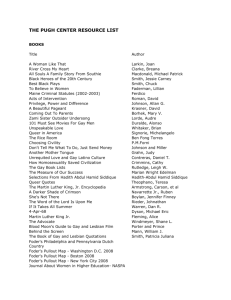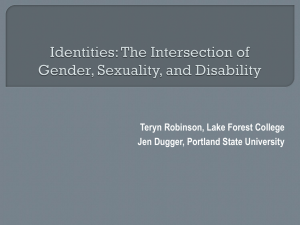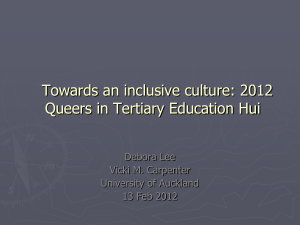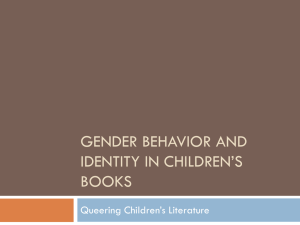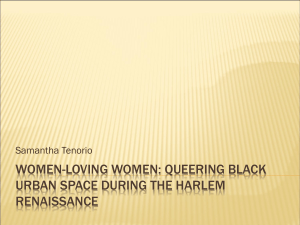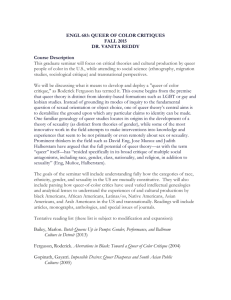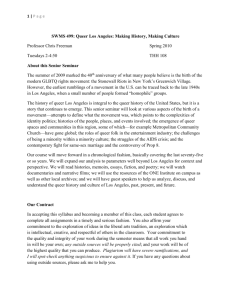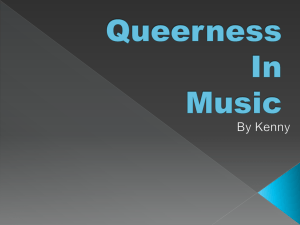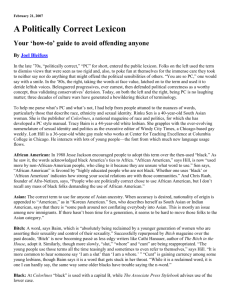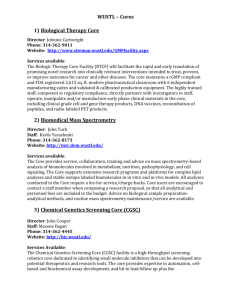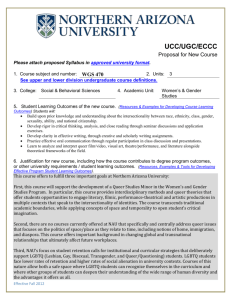WGSS 3172: Queer Histories
advertisement
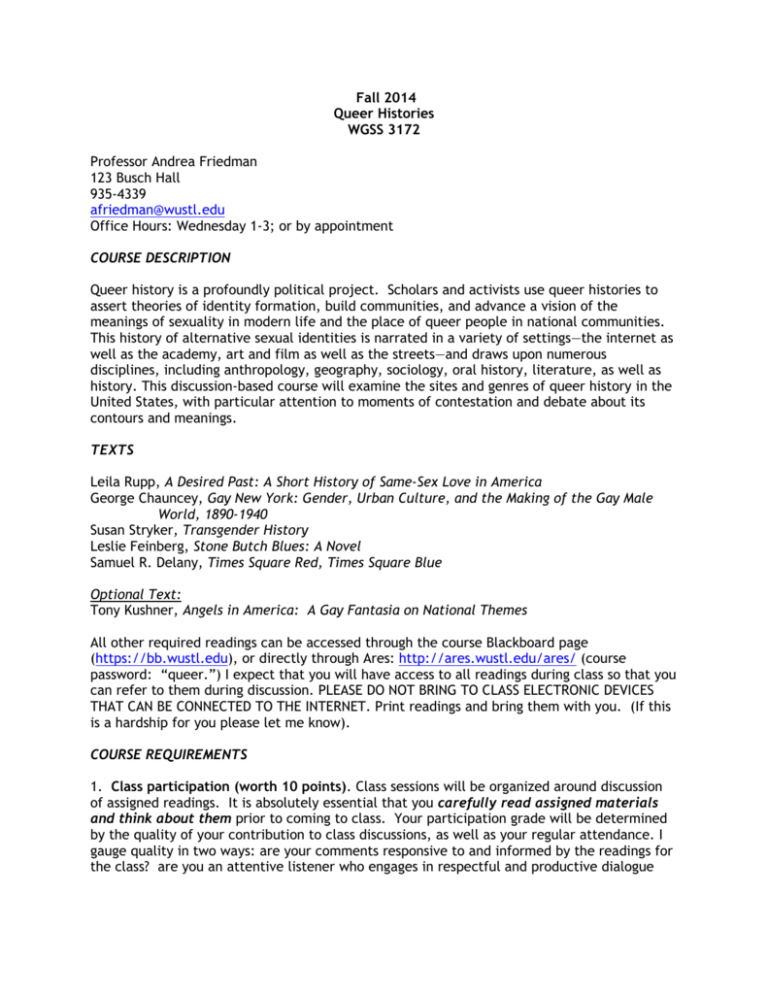
Fall 2014 Queer Histories WGSS 3172 Professor Andrea Friedman 123 Busch Hall 935-4339 afriedman@wustl.edu Office Hours: Wednesday 1-3; or by appointment COURSE DESCRIPTION Queer history is a profoundly political project. Scholars and activists use queer histories to assert theories of identity formation, build communities, and advance a vision of the meanings of sexuality in modern life and the place of queer people in national communities. This history of alternative sexual identities is narrated in a variety of settings—the internet as well as the academy, art and film as well as the streets—and draws upon numerous disciplines, including anthropology, geography, sociology, oral history, literature, as well as history. This discussion-based course will examine the sites and genres of queer history in the United States, with particular attention to moments of contestation and debate about its contours and meanings. TEXTS Leila Rupp, A Desired Past: A Short History of Same-Sex Love in America George Chauncey, Gay New York: Gender, Urban Culture, and the Making of the Gay Male World, 1890-1940 Susan Stryker, Transgender History Leslie Feinberg, Stone Butch Blues: A Novel Samuel R. Delany, Times Square Red, Times Square Blue Optional Text: Tony Kushner, Angels in America: A Gay Fantasia on National Themes All other required readings can be accessed through the course Blackboard page (https://bb.wustl.edu), or directly through Ares: http://ares.wustl.edu/ares/ (course password: “queer.”) I expect that you will have access to all readings during class so that you can refer to them during discussion. PLEASE DO NOT BRING TO CLASS ELECTRONIC DEVICES THAT CAN BE CONNECTED TO THE INTERNET. Print readings and bring them with you. (If this is a hardship for you please let me know). COURSE REQUIREMENTS 1. Class participation (worth 10 points). Class sessions will be organized around discussion of assigned readings. It is absolutely essential that you carefully read assigned materials and think about them prior to coming to class. Your participation grade will be determined by the quality of your contribution to class discussions, as well as your regular attendance. I gauge quality in two ways: are your comments responsive to and informed by the readings for the class? are you an attentive listener who engages in respectful and productive dialogue with other members of the class? Students are permitted three absences; additional absences will affect your class participation grade. 2. Journal (worth 30 points). Students must contribute 5 entries over the course of the semester to the journal on your blackboard page. In each entry you should provide a critical response to the readings for the week. You need not discuss all of the readings, but you must provide an entry that reveals serious engagement with the themes and questions raised by course materials. Due that week by Friday, 5 pm. See assignment for more detail. 3. Papers (worth 30 points each). You will complete two essays, in which you use class readings to respond to a question. These 6-7 page essays will be due on September 30 and November 25. Late papers will be penalized by one letter grade for each 24-hour period past the due date. There are no formal exams. ALL course requirements must be met to pass this course. For students who are taking the course pass/fail or credit/no credit, a passing grade is C-. INCLUSIVE CLASSROOMS Washington University provides accommodations and/or services to students with documented disabilities. Students should seek appropriate documentation through the Disability Resource Center http://cornerstone.wustl.edu/disabilityresources.aspx, which will approve and arrange any accommodations. Please feel free to speak to me about your individual learning needs. Language or behavior that makes other students feel unwelcome in this classroom will not be tolerated. Examples range from simply interrupting or ignoring others while they are talking to overt harassment or intimidation with reference to race, sex, gender identity, sexual identity, religion, ethnicity, nationality, ability or political belief. Washington University’s Policy on Discrimination and Discriminatory Harassment can be found at http://hr.wustl.edu/policies/Pages/DiscriminationAndDiscriminatoryHarassment.aspx ACADEMIC INTEGRITY Plagiarism or other violations of academic integrity will result in a failing grade on the assignment, and may result in a failing grade for the course. Please review Washington University’s academic integrity policy at http://www.wustl.edu/policies/undergraduateacademic-integrity.html. A helpful guide to understanding plagiarism can be found at http://writing.wisc.edu/Handbook/QPA_plagiarism.html. MISCELLANEOUS All students are strongly encouraged to participate in the online course evaluation system at the end of the semester, by visiting http://evals.wustl.edu This syllabus is a work-in-progress. I reserve the right to change it at any time. COURSE OUTLINE I. THE POLITICS OF QUEER HISTORY Week 1 Tu 8/26 Th 8/28 Week 2 Tu 9/2 Introduction Halperin, “Is There a History of Sexuality?”; Bennett, “Lesbian-Like” and the Social History of Lesbianisms” Th 9/4 Freedman, “The Burning of Letters Continues;” Hammond, “Black (W)holes and the Geometry of Black Female Sexuality” D’Emilio, “Capitalism and Gay Identity;” Kunzel, “Situating Sex” Week 3 Tu 9/9 Th 9/11 Rupp, A Desired Past, pp. ix-100 Rupp, A Desired Past, pp. 101-199 II. ORIGIN STORIES Week 4 Tu 9/16 Th 9/18 Chauncey, Gay New York, Part I and pp. 365-72 Chauncey, Gay New York, Part II Week 5 Tu 9/23 Th 9/25 Chauncey, Gay New York, Part III NO CLASS Week 6 Tu 9/30 Th 10/2 Lecture and film: The Stonewall Rebellion FIRST ESSAY DUE Suran, “Coming Out Against the War;” Armstrong & Crage,“Movements and Memory: The Making of the Stonewall Myth;” Manalansan, “In the Shadows of Stonewall” III. TRANS*FORMING HISTORIES Week 7 Tu 10/7 Th 10/9 Stryker, Transgender History, pp. vii - 89 Stryker, Transgender History, pp. 91-157 Week 8 Tu 10/14 “She Even Chewed Tobacco;” Alamilla Boyd, “The Materiality of Gender” Th 10/16 Feinberg, Stone Butch Blues, entire IV. GEOGRAPHIES OF THE PAST AND PRESENT Week 9 Tu 10/21 View before class, Boys Don’t Cry View in class: The Brandon Teena Story Th 10/23 Halberstam, “The Brandon Teena Archive;” Gray, “There Are No Queers Here” Week 10 Tu 10/28 Selections from Sweet Tea Th 10/30 Pratt, “Identity: Skin Blood Heart” Week 11 Tu 11/4 www.rainbowhistory.org/ “The Clubhouse” and “Gay Women’s Alternative” Exhibits Th 11/6 Guest speaker, St. Louis LGBT History Project Week 12 Tu 11/11 Shah, “Perversity, Contamination, and the Dangers of Queer Domesticity;” Shah, “Policing Strangers and Borderlands” YOU ARE ENCOURAGED TO ATTEND NAYAN SHAH’S LECTURE: 11/12, 3:30 pm, 18 Busch Hall Th 11/13 Somerville, “Sexual Aliens and the Racialized State;” Brier, “The Immigrant Infection” Week 13 Tu 11/18 Delany, Times Square Red, Times Square Blue, Part I Th 11/20 Delany, Times Square Red, Times Square Blue, Part II V. AIDS and History: Reading Angels in America Week 14 Tu 11/25 Nielsen, “Background and Context” SECOND ESSAY DUE Th 11/27 THANKSGIVING Before December 2 class view the HBO version of Angels in America, “Millennium Approaches” (Part 1) and “Perestroika” (Part 2) (on reserve at Olin; “Millennium Approaches” available for free on Amazon Prime Video [denoted “Season 1”]) Week 15 Tu 12/2 Cadden, “Strange Angel: The Pinklisting of Roy Cohn”; Solomon, “Wrestling with Angels” Th 12/4 Savran, “Ambivalence, Utopia, and a Queer Sort of Materialism”

